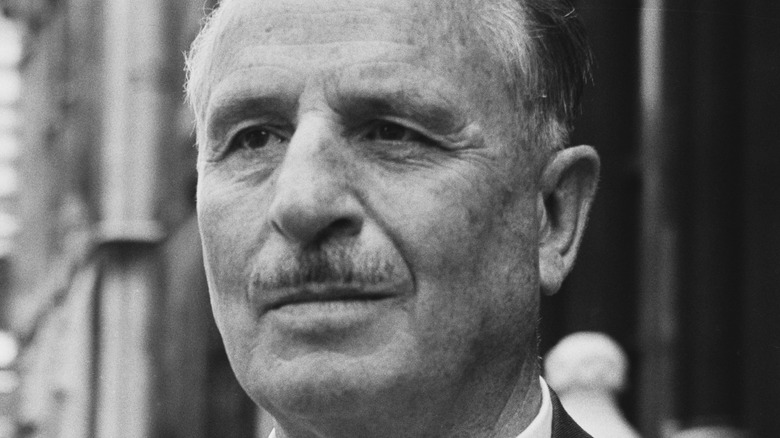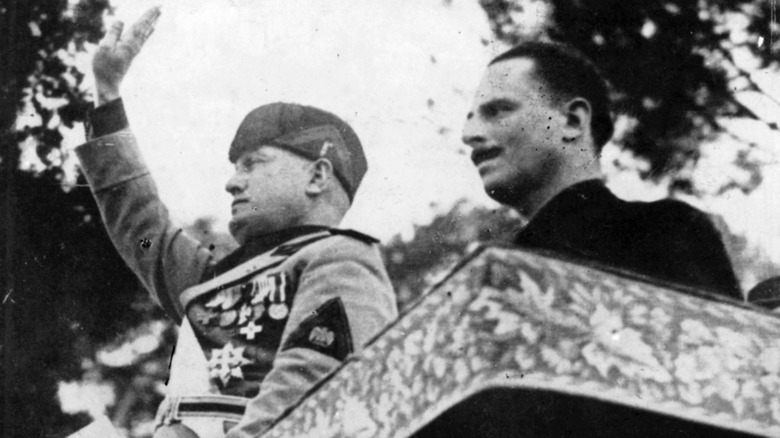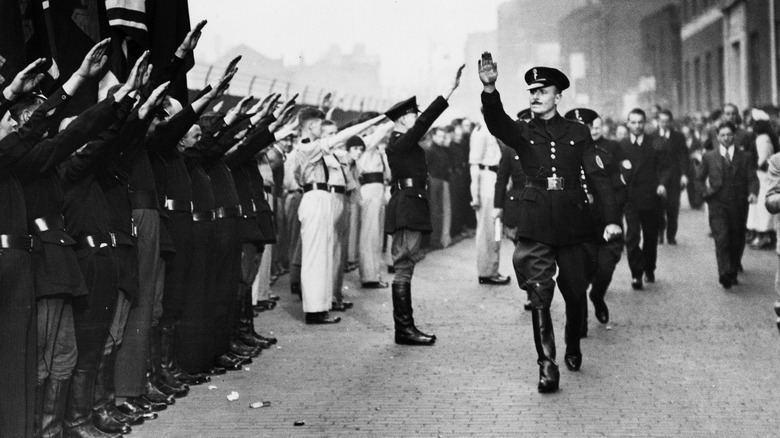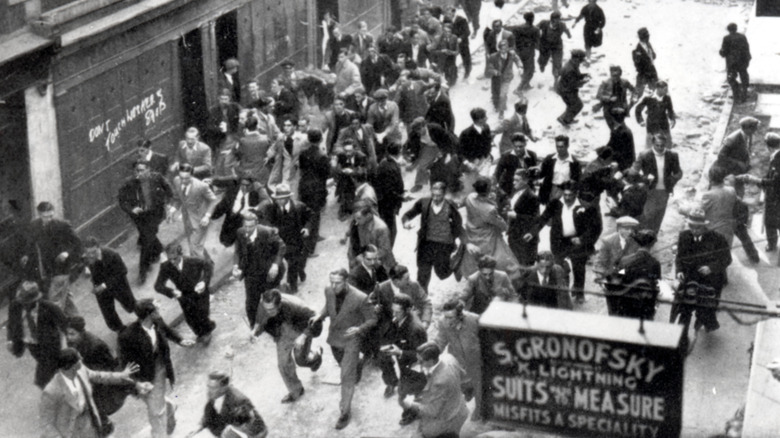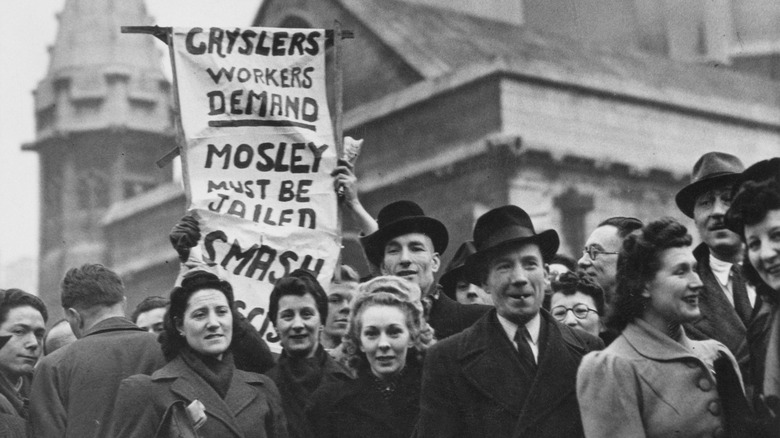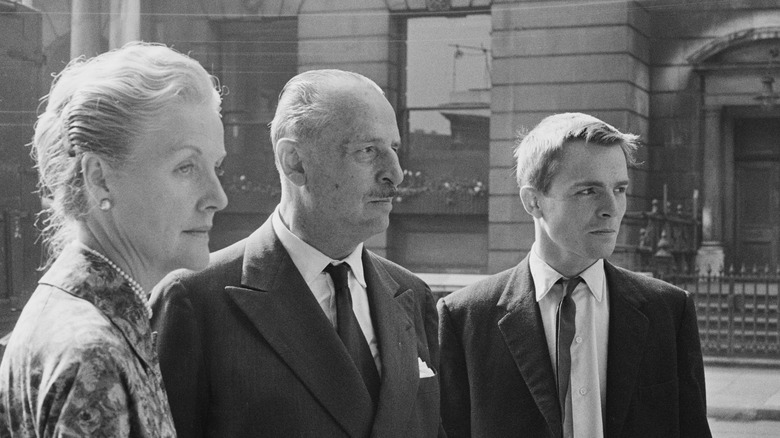British Politician Sir Oswald Mosley's Disturbing Descent Into Fascism
In the 1920s and '30s, severe economic hardship saw a wave of populist movements sweeping Europe. In Germany, Spain, and Italy, fascist governments took the reigns of power — with disastrous consequences (via Pittsburgh University). In Britain, on the other hand, a new and angry group of young fascists never quite made it to the top, despite the best efforts of one womanizing politician — Sir Oswald Mosley, then the unsettling mustachioed face of British fascism.
Like many British MPs past and present, Mosley came from an aristocratic household, born and bred in Mayfair in London. He was so posh, in fact, that his first wedding was attended by King George V (via History Extra). As a young man, Mosley distinguished himself by becoming the youngest ever member of parliament (MP) at just 22, and he rubbed shoulders with anyone and everyone of any political importance (via the BBC).
However, although he was once the very face of respectability, known for his polished rhetoric and high-class connections, on a personal level, Mosley was never a pillar of integrity, and he slowly drifted toward fascism. Mosley grew to become something of an oddity and — eventually — somebody truly hated as Britain entered the World War II.
Pals with Mussolini
Like Mussolini before him, Sir Oswald Mosley flirted with both sides of the political spectrum, serving first as a Conservative MP and then as a Labour minister (via History Extra). But Mosley found no permanent place in either party. After the 1929 Wall Street crash, the young politician demanded the British government take some radical steps to protect the economy and was brushed aside. Ego wounded, he left the party for good and struck out on his own.
By 1931, Mosley had founded the New Party. Although not yet overtly fascist, he had already surrounded himself with a group of violent thugs — a bunch of infamous brawlers known as the "Biff Boys" (via the London Review of Books). Mosley's new venture was not a success, and he finished dead last when up for election in 1931. Searching for solutions, he traveled to Italy, where here was entranced by none other than Il Duce himself. Taking a strong interest in Italian fascism, he returned home with ideas of replicating it.
Mosley's political shapeshifting was dramatic. Although just five years earlier, in 1927, Mosley had referred to the British Fascists as "black-shirted buffoons" (via the London Review of Books), he went on to found the British Union of Fascists (the BUF) in 1932 (via the BBC). Like other would-be dictators past and present, Mosley made himself the center of a personality cult replete with parades and black military uniforms. The group adopted the Nazi-favored Roman salute and lightning bolt symbol as their logo.
Hurrah for the black shirts!
Could Britain have turned fascist at this time? Well, maybe. In 1934, two major British newspapers, the Daily Mail and the Mirror, came out in support of Sir Oswald Mosley's fascists. A now infamous article entitled "Hurrah for the Blackshirts!" was printed in the Daily Mail in support of Mosley, and it has gone down in journalistic history as an embarrassment. The Daily Mail in particular was disturbingly optimistic about Hitler throughout the 1930s, and the paper's owner, Lord Rothermere, supported appeasement right up to 1939 (via The Times of Israel).
Not everyone will be surprised to read that the Daily Mail once had fascist leanings — but Mosley also garnered support from some other more surprising sections of society as well. He was a surprisingly big hit among feminists, for example, and he won support from a number of rebellious suffragettes (via The Oxford Dictionary of National Biography). Many famous writers also wrote in support of him — with Ezra Pound leading the way among them. Finally, many working-class men and women, who felt ignored and alienated by the British establishment, took an interest in Mosley's promises.
Around the same time, the fiery demagogue also met his match-made-in-hell, Diana Mitford, a Hitler fangirl and unapologetic fascist (via The Guardian). The Mitford sisters were glamorous celebrities at this time, known for their beauty and their eccentricities. Diana's sister, Unity Mitford, is rumored to have dated Hitler (via DW), and Mosley and Diana were married in secret in Berlin in 1936, with Hitler and Joseph Goebbels in attendance.
The battle of Cable Street
According to the BBC, at its height, the British Union of Fascists attracted around 50,000 members, but they faced stiff resistance whenever they took to the streets. Many people were appalled by Sir Oswald Mosley's men from the off. The BUF's rhetoric was laced with anti-semitic rhetoric, which — as in Germany — placed the blame for all the world's ills on a secretive Jewish banking conspiracy (via the London Review of Books).
In 1934, a fascist rally in Olympia in London turned violent. Anti-fascist hecklers snuck into the event, and the intruders were hospitalized by fascist demonstrators. The violent reaction of Mosley's men was met with widespread disgust (via History Extra). Unfazed by the bad press, the BUF began attacking and harassing Jews in London. Things reached a head in 1936 at an event known as the "Battle of Cable Street," during which a huge BUF rally was met by more than 250,000 anti-fascist protesters in East London, who actively blocked their path (via The Open University).
To contain the ensuing riot, 10,000 police officers were called up to keep the peace, but many people still wound up injured (via The Open University). The fallout from the Battle of Cable Street put the breaks on Mosley's fascists when the Public Order Act was passed later that same year in response. The law banned political uniforms and clamped down on inflammatory speech at public rallies.
Mosley's Arrest
Any semblance of respectability lost, the BUF never gained any serious momentum. Sir Oswald Mosley had a brief spike in popularity in 1938 due to his anti-war policies — but by 1939, Britain had joined the war (via The Oxford Dictionary of National Biography). Mosley, who had been receiving funds from both Mussolini and Hitler, must have known his days were numbered (via History Extra). Finally, after Winston Churchill was elected in 1940, Mosley and his wife Diana were both arrested, and the BUF was banned for good.
Churchill feared that Mosley would work with Hitler if he ever invaded, and he was classed as a major security risk. Wartime legislation allowed Churchill to detain anyone without a trial, but nobody was bothered by Mosley's arrest, and polls from the time suggest it was a popular move (via The New York Times). The pair remained in prison until 1943 when Mosley fell ill, and their release sparked outraged protests. Regrettably, even after the war, Mosley did not retire from politics.
After the War
Unfortunately, a stint behind bars did not change Sir Oswald Mosley's tune. After the war, he continued to promote himself as a fascist, founding another far-right group, the Union Movement (via History Extra). This time the group didn't just cause trouble in the streets — they also promoted Holocaust denial in their literature. But a nation that had so recently sent its young men to fight and die in order to defeat the Nazis did not find this rhetoric very appealing. Facing considerable opposition, Mosley moved to Ireland. He returned briefly in an attempt to ghoulishly capitalize on heightened racial tensions in London in the '60s before vanishing to France for good (via the BBC).
Although Mosley died in 1980, his family continued to produce some shocking headlines. In 1989, for example, Diana Mosley appeared on an episode of BBC Radio Four's "Desert Island Discs," where she shocked listeners by praising Hitler (via The Telegraph). Similarly, Mosely's son Max Mosely became a bizarre eye-brow-raising celebrity in the U.K. until he died in 2021. He is best remembered for allegedly having an orgy with a group of women dressed in a Nazi uniform (via the Daily Mail).
Today, readers can watch a highly entertaining and fictionalized account of Mosley's rise to prominence in the hit show "Peaky Blinders."
